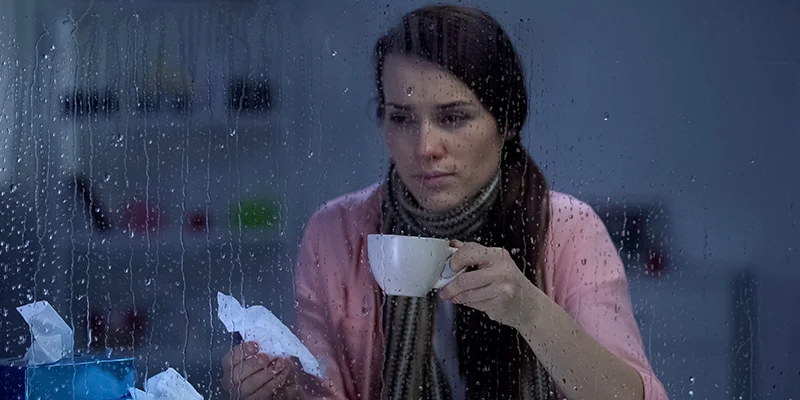Common Monsoon Illness and Precautions
The monsoons are a much-needed relief from the unbearable summer heat. Moreover, they are a saviour, as they raise the water levels in the reservoirs and are a blessing for farming. Despite the many advantages of the monsoon, there is a wide array of infections that it brings along. Not all monsoon diseases are serious, but if not treated in time, their severity may increase.
Our medical team at Apollo offers the best treatment and will counsel you on the necessary monsoon precautions. Here is all you should be aware of when it comes to common monsoon illnesses and precautions.
- Common cold and cough:
Monsoon brings rain spells, and the sunlight vanishes, making the weather colder and more humid than the rest of the year. Respiratory illness is at its peak during this time. A running nose, sneezing, coughing, throat irritation, and inflamed or red throat with difficulty in swallowing are very common symptoms. A low-grade fever may sometimes accompany these symptoms. Hence, it is necessary to take proper care. Consult your family doctor before taking any medicines for cough and cold. Soothe your throat with sips of warm water and gargle regularly.
- Mosquito-borne diseases:
Stagnant water that builds up around the roads or in your garden during monsoon harbours mosquito species that may be carriers of dengue, chikungunya, and malaria. The common symptoms of these mosquito-borne diseases include high-grade fever, chills, muscle weakness, and pain. Malaria is a plasmodial infection that may become life-threatening if neglected. Dengue is a viral infection in which your blood platelet levels drop. It is a risky situation as it affects blood clotting properties and needs immediate medical attention. In chikungunya, your joints get inflamed, affecting your mobility. There are diagnostic tests to detect these infections. Early diagnosis would help in proper treatment and speedy recovery.
These diseases are better prevented by keeping a check on mosquito breeding. Prompt treatment with anti-malarial and plenty of fluid and electrolyte intake, in addition to fever-reducing medications, can help treat these conditions.
- Viral Fever:
Influenza or flu is a common type of monsoon illness that often accompanies cold and cough during the rainy season. It spreads from person to person. Rest and medicines for fever can be of great help. Contact your doctor if you are experiencing fever and weakness.
- Digestive system infections:
Unclean water supply during monsoon may result in stomach infections. The following stomach infections are common during monsoon:
- Dysentery and diarrhoea: Amoebic dysentery or bacteria-induced diarrhoea may result in stomach pain, loose motions, and nausea. Appropriate medication and adequate water with electrolytes will help replenish the fluid loss and help you maintain your energy levels. Home-cooked, safe food that is easy to digest will help your stomach recover faster.
- Typhoid: It is a serious bacterial infection that, if untreated, may be life-threatening. High fever, stomach pain, nausea, and vomiting are common symptoms of typhoid. Consult your doctor for proper medication to treat this infection.
- Hepatitis A and Jaundice: Hepatitis A is caused by a virus that results in inflammation (swelling) of the liver. It is a vaccine-preventable disease. Poor sanitation, unhygienic eating habits, and water and food contamination can cause liver dysfunction, giving your eyes a yellow colour, yellow urine, white stools, and stomach pain. Yellow coloration is due to increased bilirubin levels. Immediately contact your doctor for treatment options for jaundice.
- Leptospirosis:
It is a bacterial infection that is caused when your cuts or bruises are exposed to muddy and contaminated rainwater. The infection may cause a high fever. Leptospirosis can also lead to inflammation of the membrane around the brain and spinal cord (meningitis). Left untreated, it may progress to serious health conditions such as liver and kidney damage.
- Skin allergies and infection:
Onset on monsoon also welcomes skin allergies. If you have weak immunity or are suffering from diabetes, you are more vulnerable to skin infections during the monsoons. Skin allergies, rashes, and infections from fungus, yeast, or bacteria are quite common because of high humidity. It is always advisable to keep your skin dry and wear loose clothes.
Precautions to be taken during the monsoon:
Some simple measures will help in monsoon disease prevention. Here are some standard precautionary measures:
- Always carry an umbrella or a raincoat to avoid getting wet in the rain.
- Dry yourself quickly if you get wet, and stay warm.
- Stay hydrated. Have adequate fluid intake, although your thirst might be reduced during the rainy season.
- Use mosquito-repellent creams when you step outside. At home, use mosquito nets or repellents.
- Keep your surroundings clean. Check for stagnant water under refrigerators, in coconut shells, and on vehicle tyres, as they are prime breeding spots for mosquitoes.
- Drink boiled and filtered water to avoid water-borne infections.
- Eat home-cooked, nutritious food. Eating outside food may lead to food-borne diseases.
- Follow hygienic habits. Wash your hands regularly before meals and after using the toilet.
- Get vaccinated and avoid contact with the infected person. Take precautionary flu shots and Covid vaccine after consulting your doctor.
- Always wear a mask and follow social distancing practices to avoid the spread of air-borne infections.
- Take vitamin supplements, especially when you are deficient in vitamin B12 and D3.
Conclusion
Lack of sunlight and humid weather may bring several monsoon diseases. The spread of monsoon diseases is either through the air, water, or mosquito bites. Therefore, we need to take precautionary steps. Monsoon disease prevention tips are quite simple and easy to follow! Prevention is always better than cure. So, stay protected and enjoy the monsoon season. Pregnant women, young children, and infants are more vulnerable to infectious diseases and therefore need to be more careful.
Consult your doctor if you or your family member notice any symptoms of monsoon illness.

